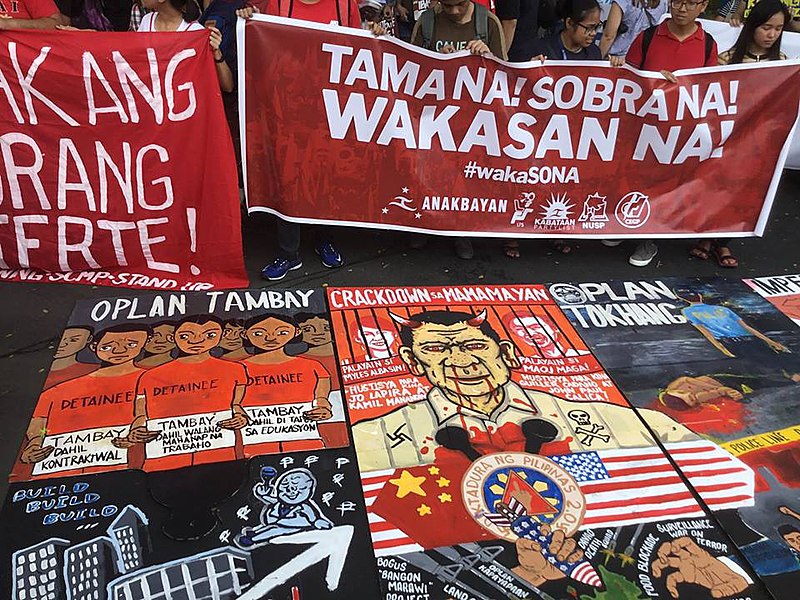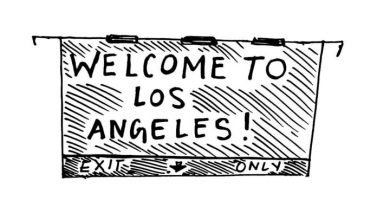Pilipino Unity Against the Reign of Terror

Photo from Wikimedia Commons Attribution-ShareAlike 4.0 International (CC BY-SA 4.0)
Last summer, I flew across the Pacific to the Philippines. I was more than 7,000 miles away from the United States, and yet a similar style of President Trump’s reckless leadership lingered. The president in my country of heritage and my country of residence threatens the voice of women and challenges the structure of a liberal democracy.
Today, the Philippines faces a problem of moral hazard where the government creates the desired end results by manipulating the means. President Rodrigo Duterte is notably regarded as one of the most infamous leaders of today regarding his offenses towards women, his drug-related extrajudicial killings, and his assault on free speech.
During the 2016 presidential campaign and after, President Duterte has made public misogynistic, sexist, vulgar remarks. Joking about rape, molesting his maid, and ordering his troops to shoot female communist dissidents in their vaginas are just a few outrageous comments that he has publicly and proudly professed. Duterte so often attacks women that a website organized by Maria Ressa, a well-respected journalist whom Duterte arrested twice, gives updates on his latest transgressions.
Social media movements such as #EveryWoman and #BabaeAko (I’m a Woman) are a few groups which have emerged in the last few years in response to Duterte’s overt hostility towards women. They have garnered support around the world. Women of the #BabaeAko social media campaign were recognized by TIME magazine last year for their global impact that has empowered Pilipino women. Women of the Philippines are the bedrock of a nation. Pilipino women have raised and nurtured families, participated in politics, and competed in various fields. Two women, Corazon Aquino and Gloria Arroyo, have held the office. The country has come a long way from once limiting women to subservient, modest, domestic roles to powerful leaders and competitive forces.
Still, upon my travel last summer to my motherland, there were visible remnants of a colonial society and the entrenched patriarchal system. I came across a job posting taped to a store window that was looking for single women between the ages of 18 to 28 years old to be qualified for a position in sales. Determining employment based on women’s age and relationship status is sexist discrimination that is very much present and normalized in and out of the workplace, and with a man like Duterte in a position of power, I sensed a darker reality for women.
President Duterte has not only attacked women but also initiated a brutal and bloody crackdown on drug dealers and those who struggle with drug dependency, leaving thousands of people dead without due process. As the Mayor of the city of Davao for 22 years, Duterte has been connected with the extrajudicial killings conducted by the notorious vigilante group, Davao Death Squad (DDS). Aside from the ex-officer and hitman who has confessed to implementing Duterte’s orders, the identities of most DDS members remain unknown. The group of vigilantes has murdered more than 7,000 men, women, and children suspected of petty crimes, according to Amnesty International. During the presidential campaign, Duterte vowed to eliminate drugs by any means necessary. The country was well aware of the bloodthirstiness of the man running for office, yet many Pilipinos still disregarded his inhumane approaches and elected him for the presidency. In appreciation for his blunt personality and iron fist, they trusted that this man would get the job done. They believed Duterte would clear the streets of drugs, and make the nation safer. Instead, the antidote of the drug problem just led to a growing number of unlawful deaths.
Underprivileged Pilipinos are the most vulnerable targets of the drug war. In densely packed homes, people watch as nearby residences get raided by the cops and as their neighbors get brutally beaten and killed in the middle of the street. Bodies are slain in view of the public eye, making the streets a perilous killing field; only three police officers have been found guilty. Meanwhile, Duterte has admitted to using marijuana in order to help him better manage his tiring activities and schedule – which is ironic, given that cannabis is an illegal drug in the Philippines. His spokespeople defended the president, saying that he was only “joking”; however the joke is far from funny. It is cruel and insulting to the victims who have perished at the hands of police and assailants in the name of an anti-drug campaign. If he is making light of this subject and joking about the havoc he wreaked on a nation, then it reveals how he sees human lives as nothing but a joke.
In the midst of examining the crimes committed by the Philippine government, the International Criminal Court prosecutor Fatou Bensouda, who has been looking into the situation in the Philippines, was threatened with arrest upon arrival by the president himself. Duterte does not believe that the court has legitimate jurisdiction over him nor the right to investigate. As of March 17, 2019, the Philippines became the second country to withdraw from the International Criminal Court, as the President claims to have sufficient “mechanisms to ensure the justice system functions properly.” The Philippines’s judicial system, at this point, is very unreliable and looks like a dead end for justice, and a source of increased stress for Pilipinos.
Nevertheless, as the death tolls increase, so do President Duterte’s approval ratings. According to the Social Weather Station, a public opinion polling institution in the Philippines, 79 percent of Pilipinos are satisfied with Duterte’s performance which rose from his 74 percent rating in December. The support for Duterte’s drug war presents a clear divergence from teachings of the Christian faith that is practiced by 81 percent of the population. People have chosen to compartmentalize the teachings of the Church, particularly with the commandment “thou shalt not kill.”
If there’s one thing you should know about Pilipinos, it is that we are always hopeful for brighter days ahead. We are fighters against impunity and injustice. After the 1980s People Power Revolution against dictator Ferdinand Marcos, the nation prides itself on being a trailblazer for future nonviolent political movements. It is evident through the many civil societies that recently emerged to combat the political and social attacks committed by President Duterte and his administration. The unity among Pilipinos has been proven to be powerful in the past and present. I stand in solidarity with my family, friends, and kabayan.




